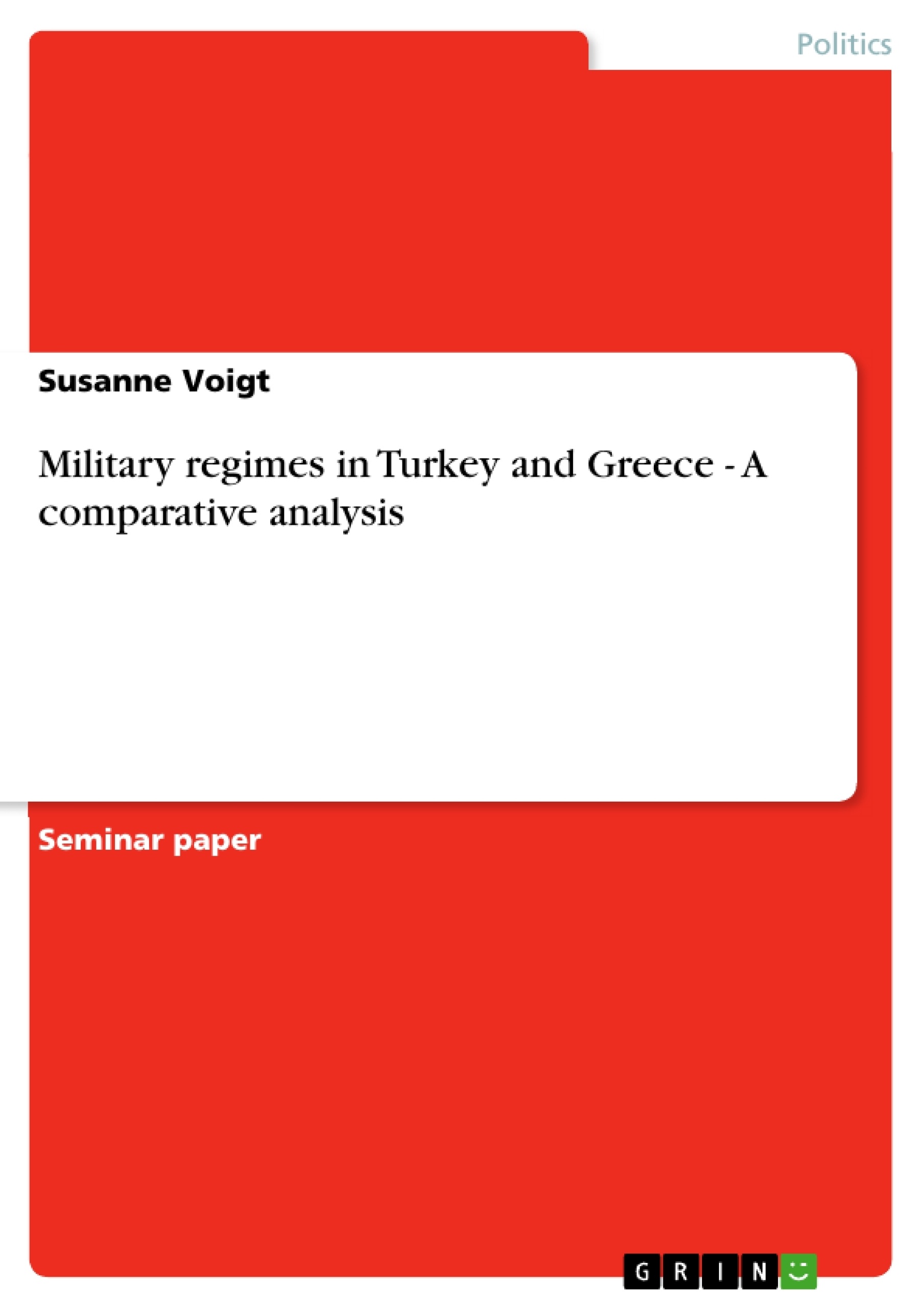This term paper shall take a deeper look at the military regimes in Turkey and Greece. For a better understanding of the historical background an overview over the military regimes in point 2 of the term paper is inevitable. After that in point 3 – the main part of the paper – a comparative analysis is carried out whereby at first the theoretical framework is pointed out before it comes to the actual comparison.
My analysis focuses on the military regimes that were evoked by coups d’état in both countries. With limitations to space I only draw attention to the last military regimes in both countries, meaning the junta in Greece from 1967-74 and in Turkey from 1980-83. Those timeframes are to be compared in this term paper. In the following part 4 I will also draw my attention to the role of the military in Greece and Turkey today, how the perception of the military changed and the role it is taking in the current society with regard to its power and influence.
This will lead to a final estimation in the last part of the term paper.
Inhaltsverzeichnis (Table of Contents)
- Introduction
- Historical overview of the military regimes
- Greece 1967-1974
- Turkey 1980-83
- The comparative analysis
- The theoretical framework
- Civil-military relationships by Nordlinger and Janowitz
- Types of military regime by Nordlinger, Clapham and Philip
- The practical analysis
- General findings – Similarities and Differences
- Application of the Theories
- The theoretical framework
- The role of the military today
- In Greece
- In Turkey
- Conclusion
Zielsetzung und Themenschwerpunkte (Objectives and Key Themes)
This term paper aims to provide an in-depth analysis of the military regimes in Turkey and Greece. It explores the historical context of these regimes, conducts a comparative analysis using theoretical frameworks, and examines the current role of the military in both countries.
- The historical background of military rule in Turkey and Greece
- A comparative analysis of the military regimes in both countries
- The theoretical framework for understanding civil-military relationships
- The impact of the military regimes on society and politics
- The current role of the military in Turkish and Greek society
Zusammenfassung der Kapitel (Chapter Summaries)
- Introduction: This chapter sets the stage for the paper by introducing the topic of military regimes in Turkey and Greece and outlining the structure and scope of the analysis.
- Historical overview of the military regimes: This chapter provides a general overview of the historical context of the military juntas in Turkey and Greece, focusing on the events, conditions, and background information that led to their establishment.
- Greece 1967-1974: This chapter explores the military junta in Greece from 1967-1974, covering the coup d'état, the regime's policies, its impact on society, and its eventual downfall.
- Turkey 1980-83: This chapter examines the military regime in Turkey from 1980-1983, analyzing the coup d'état, the regime's objectives, its social and political impact, and its eventual transition to a civilian government.
- The comparative analysis: This chapter delves into the comparative analysis of the military regimes in Turkey and Greece. It introduces the theoretical framework used for the comparison, including the concepts of civil-military relationships and types of military regimes. It then applies these theories to the specific cases of Turkey and Greece, highlighting similarities and differences between the two regimes.
- The role of the military today: This chapter investigates the current role of the military in both Turkey and Greece, analyzing how the perception of the military has evolved and the influence it exerts on society and politics.
Schlüsselwörter (Keywords)
This paper focuses on the key themes of military regimes, civil-military relationships, comparative analysis, Greece, Turkey, coups d'état, political instability, societal impact, and the current role of the military in both countries. The analysis draws upon theoretical frameworks developed by prominent scholars in the field, such as Nordlinger and Janowitz, to provide a comprehensive understanding of the complexities of military intervention in politics.
Frequently Asked Questions
What is the focus of the comparison between Turkey and Greece?
The paper compares the military regimes established by coups d'état, specifically the Greek junta (1967-74) and the Turkish military regime (1980-83).
Which theoretical frameworks are used to analyze these regimes?
The analysis utilizes theories on civil-military relationships by scholars like Nordlinger and Janowitz, and classifications of military regimes by Clapham and Philip.
What were the key characteristics of the Greek junta (1967-1974)?
The chapter explores the coup's origins, the regime's specific policies, its societal impact, and the factors that led to its eventual downfall.
How did the 1980-83 Turkish military regime differ from others?
The study examines the objectives of the 1980 coup and how the military managed the transition back to a civilian government within a relatively short timeframe.
How has the role of the military in Turkey and Greece changed today?
The paper analyzes the current societal perception of the military and the evolution of its power and influence in both modern Turkish and Greek societies.
- Citation du texte
- Master of European Studies Susanne Voigt (Auteur), 2007, Military regimes in Turkey and Greece - A comparative analysis, Munich, GRIN Verlag, https://www.grin.com/document/84955



